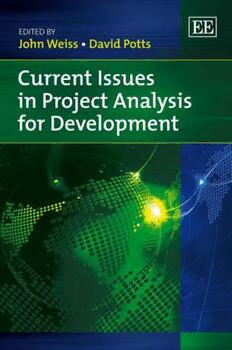
Current Issues in Project Analysis for Development PDF
Preview Current Issues in Project Analysis for Development
Current Issues in Project Analysis for Development Edited by John Weiss Professor of Development Economics and Associate Dean, Research, University of Bradford, UK David Potts Senior Lecturer, Bradford Centre for International Development, University of Bradford, UK Edward Elgar Cheltenham, UK • Northampton, MA, USA MM22991177 -- WWEEIISSSS 99778811884488444455335522 PPRRIINNTT..iinndddd iiiiii 2211//0066//22001122 1144::0077 MM22991177 -- WWEEIISSSS 99778811884488444455335522 PPRRIINNTT..iinndddd vviiiiii 2211//0066//22001122 1144::0077 © John Weiss and David Potts 2012 All rights reserved. No part of this publication may be reproduced, stored in a retrieval system or transmitted in any form or by any means, electronic, mechanical or photocopying, recording, or otherwise without the prior permission of the publisher. Published by Edward Elgar Publishing Limited The Lypiatts 15 Lansdown Road Cheltenham Glos GL50 2JA UK Edward Elgar Publishing, Inc. William Pratt House 9 Dewey Court Northampton Massachusetts 01060 USA A catalogue record for this book is available from the British Library Library of Congress Control Number: 2012935268 ISBN 978 1 84844 535 2 (cased) Typeset by Servis Filmsetting Ltd, Stockport, Cheshire Printed and bound by MPG Books Group, UK 2 0 MM22991177 -- WWEEIISSSS 99778811884488444455335522 PPRRIINNTT..iinndddd iivv 2211//0066//22001122 1144::0077 MM22991177 -- WWEEIISSSS 99778811884488444455335522 PPRRIINNTT..iinndddd vviiiiii 2211//0066//22001122 1144::0077 Contents List of contributors vii 1 Editors’ introduction 1 David Potts and John Weiss 2 Estimating a shadow exchange rate 30 Elio Londero 3 Shadow wage rates in a changing world 59 David Potts 4 Semi- input–output methods of shadow price estimation: are they still useful? 74 David Potts 5 Projects and the MDGs: estimating poverty impact 100 Manabu Fujimura 6 Projects and risk 123 John Weiss and Keith Ward 7 Discounting: does it ensure intergenerational equity? 136 Erhun Kula 8 Environmental valuation 161 P.B. Anand 9 Assessing the benefi ts of new or improved roads 189 Chris Nash 10 Project appraisal in health: cost eff ectiveness approaches 200 John Weiss 11 Measuring benefi ts from education 215 David Potts 12 Cost–benefi t analysis traditions: the approach of EU regional policy 228 Massimo Florio and Silvia Vignetti v MM22991177 -- WWEEIISSSS 99778811884488444455335522 PPRRIINNTT..iinndddd vv 2211//0066//22001122 1144::0077 vi Contents Bibliography 249 Index 279 MM22991177 -- WWEEIISSSS 99778811884488444455335522 PPRRIINNTT..iinndddd vvii 2211//0066//22001122 1144::0077 Contributors P.B. Anand is Reader in Environmental Economics and Head of Division, Bradford Centre for International Development, University of Bradford, UK Massimo Florio is Professor of Public Economics, Department of Economics, Business and Statistics at the University of Milan, Italy Manabu Fujimura is Professor of Economics at Aoyama Gakuin University, Tokyo, Japan Erhun Kula is Professor of Economics, Bahçeşehir University, Istanbul, Turkey Elio Londero is a Consulting Economist and retired staff member of the Inter- American Development Bank Chris Nash is Research Professor, Institute for Transport Studies, University of Leeds, UK David Potts is Senior Lecturer, Bradford Centre for International Development, University of Bradford, UK Silvia Vignetti is Director of the Evaluation Unit, Centre for Industrial Studies, Milan, Italy Keith Ward is an economic consultant John Weiss is Professor of Development Economics and Associate Dean, Research, School of Social and International Studies, University of Bradford, UK vii MM22991177 -- WWEEIISSSS 99778811884488444455335522 PPRRIINNTT..iinndddd vviiii 2211//0066//22001122 1144::0077 MM22991177 -- WWEEIISSSS 99778811884488444455335522 PPRRIINNTT..iinndddd vviiiiii 2211//0066//22001122 1144::0077 1. Editors’ introduction David Potts and John Weiss UNDERLYING THEORY Project cost–benefi t analysis (CBA) in the context of developing countries has its practical roots in the work on water resource planning in the US in the 1930s and its theoretical foundation in the new welfare econom- ics of the 1940s (Little, 1950).1 The key feature is the insight that in any economy ‘social value’ in the sense of the contribution of any item to social welfare need not be represented by an observable market price – either because real world features of markets depart from competitive optima or because a market does not exist for the item concerned. In this framework holding everything else constant, the social value (P) for item i becomes: P 5 dW/dQ (1.1) i i where W is a measure of welfare, Q is output quantity and d denotes a small change. Social values in this sense have been variously termed shadow prices, economic prices or accounting prices to refl ect their unobservable nature. In this chapter we use the term ‘shadow prices’ although other chapters in the book sometimes use the other terms. Social welfare itself needs defi ning. From its origins in welfare econom- ics most project economic analysis takes as its starting point the individu- alistic social welfare function where total social welfare is the aggregation of individual preferences. Thus where consumers have access to more goods, their willingness to pay to obtain them defi nes social value.2 Two exceptions to this rule have been incorporated into the literature although they are rarely applied in practice. These relate to a specifi cation of social welfare based on judgements by planners or political decision makers regarding the desirability or undesirability of the consumption of particu- lar goods (‘merit wants’) or on the desirability or undesirability of par- ticular patterns of distribution of consumption or income (‘distribution 1 MM22991177 -- WWEEIISSSS 99778811884488444455335522 PPRRIINNTT..iinndddd 11 2211//0066//22001122 1144::0077
